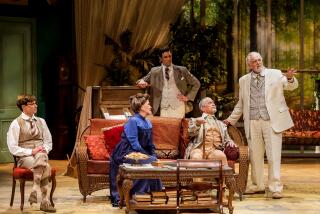A Philanderer? Oh, P-Shaw; He Just Believes in Equality
- Share via
As George Bernard Shaw’s self-labeled “unpleasant” plays go, “The Philanderer” is quite pleasant, actually. It’s a nimble exercise in self-love, an engaging comedy about detachment.
Now handsomely on view at South Coast Repertory, it involves a man suspiciously resembling Shaw, whose advanced views on men, women, Mars and Venus and the like raise the question: Can a fervent belief in equality lead to a full, philandering life?
The answers make a stylish case for wider reconsideration of Shaw’s rarely seen comedy. In every respect, this staging outstrips the company’s most recent Shaw assignment, a disappointing “Pygmalion” two years ago. If this keeps up, we’ll be getting unforgettable productions of “Geneva” and “Back to Methuselah” out of SCR yet.
The Shavian alter ego--described in the author’s stage directions as having “clever, imaginative, humorous ways”--juggles the affections of Julia Craven, a seductive, jealous ninny, and Grace Tranfield, a cool, sleek proto-feminist. The protagonist, Leonard Charteris, offers amusing critiques and counter-critiques of playwright Henrik Ibsen and his views on domestic partnership. He arranges for the match between the ninny and a starchy vivisectionist, Dr. Paramore, and more or less by design ends up alone, his former pursuer Julia off his back, unhappily betrothed to a man not nearly as fascinating as Charteris.
In his “Plays Unpleasant” preface, Shaw writes of working on “The Philanderer” in 1893, when “the discussion about Ibsenism, ‘the New Woman’ and the like, was at its height.” In his capacity as drama critic, Shaw championed Ibsen, “A Doll’s House” in particular. “The Philanderer” plays like a weird amalgam of Shaw, Ibsen and Sir Arthur Wing Pinero (not Shaw’s favorite populist laff riot). It shows what happens when a merry Ibsenite butts heads with London’s old order, where the men are men, women are women and Norwegian tragedians be damned.
*
Director David Emmes adds a brief prologue, in which we see Charteris (Douglas Weston, of the Mark Taper Forum’s “Arcadia”) on a soapbox, haranguing passersby with Shavian ideas for reform. From there, urged on by composer Michael Roth’s lovely modernist transition music, we move immediately to the top of the play. Here, that’s literalized with Charteris on a divan, on top of Grace (Kaitlin Hopkins, a standout in the recent Pasadena Playhouse “The Importance of Being Earnest”).
The action, or more accurately the talk, moves from the drawing room of Grace’s drama critic father, Cuthbertson (Don Took), to the confines of the Ibsen Club, and finally to Dr. Paramore’s flat. We’re given a plush, slightly overripe vision of this world, courtesy of scenic designer John Iacovelli’s interiors and some really swanky duds from costumer Walker Hicklin. Though you wouldn’t mind a wittier stroke or two in the Ibsen Club detailing, overall we’re treated to persuasive environments for Shaw’s philanderer, and those he exasperates.
Emmes’ cast has a lot of fun with this material. Too much, here and there. Shaw made the correct call; he wrote of his play requiring “the most expert and delicate sort of acting--high comedy acting.” Here, otherwise skilled performances such as Nancy Bell’s Julia or Francois Giroday’s Paramore tend to push “The Philanderer” into Feydeau territory, and the material can’t support too much of that. If we experience farcical overload in some performances, paradoxically, something’s lacking in Weston’s generally strong Charteris--a glint of craziness, a more energizing brand of eccentricity.
*
Nonetheless: Weston’s an easeful core to a most challenging play. Took and Richard Doyle make comic hay out of the fathers, while Hopkins reminds us she’s one of the best practitioners of period comic style around these parts. Lynsey McLeod, as the sensible sister of bratty Julia, is sturdy and charming.
Director Emmes opts for a coda implying a different resolution than Shaw’s own. The final image is that of Weston looking puzzled (rather than gloating), as if he’d just received his comeuppance and realized it too late. The directorial choice is well-considered. Even better, though, would be a concurrent reminder that Julia, in Shaw’s view, has truly run aground.
Small matters. The satisfactions provided by SCR’s 36th season opener more than compensate. It’s great to get a look at “The Philanderer” at all, and to see how well--here, anyway--an expressly topical comedy has held its own.
*
“The Philanderer,” South Coast Repertory, 655 Town Center Drive, Costa Mesa. Tuesdays-Fridays, 8 p.m.; Saturdays, 2:30 and 8 p.m.; Sundays, 2:30 and 7:30 p.m. Ends Oct. 10. $28-$47. (714) 708-5555. Running time: 2 hours, 20 minutes.
Douglas Weston: Leonard Charteris
Nancy Bell: Julia Craven
Kaitlin Hopkins: Grace Granfield
Francois Giroday: Dr. Paramore
Richard Doyle: Colonel Craven
Lynsey McLeod: Sylvia
Jared Slater: Page
Don Took: Cuthbertson
Written by George Bernard Shaw. Directed by David Emmes. Set by John Iacovelli. Costumes by Walker Hicklin. Lighting by Tom Ruzika. Music and sound by Michael Roth. Stage manager Scott Harrison.
More to Read
The biggest entertainment stories
Get our big stories about Hollywood, film, television, music, arts, culture and more right in your inbox as soon as they publish.
You may occasionally receive promotional content from the Los Angeles Times.










